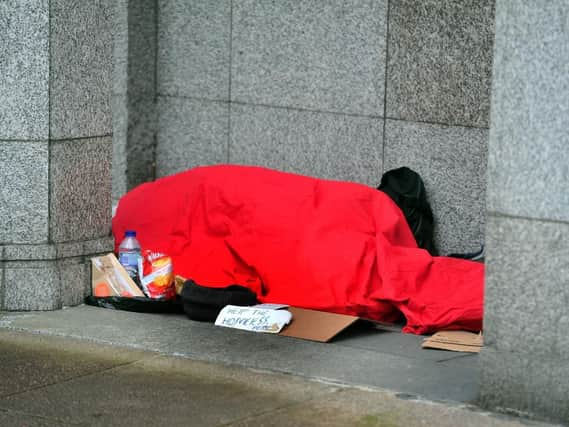'Heartbreaking' numbers of homeless dying across Yorkshire and UK, new data reveals


The Bureau of Investigative Journalism today released the final count in its Dying Homeless project, which reveals that 796 people are known to have died homeless in the last 18 months across the UK - equating to almost 11 people a week.
In Yorkshire and the Humber, 22 such people died in the same time period, but the Bureau said that is likely to be an underestimate.
Advertisement
Hide AdAdvertisement
Hide AdEleven of those were in Leeds, other deaths were recorded in York, Hull, Sheffield, Wakefield, Pontefract, Barnsley, Grimsby and Redcar and Cleveland.
New research, undertaken by University College London (UCL) and seen exclusively by the Bureau, also found homeless people are much more likely to die of treatable conditions than even the most economically-deprived housed population.
Almost a third of the deaths UCL explored were from treatable illnesses such as tuberculosis, pneumonia or gastric ulcers, which could have improved with the right medical care.
Suicide and murder accounted for many other deaths beyond that proportion.
Advertisement
Hide AdAdvertisement
Hide AdMatt Downie, director of policy and external affairs at the charity Crisis, said: “To know that so many vulnerable people have died of conditions that were entirely treatable is heart-breaking.
“What’s worse, we’re unable to learn the lessons needed to prevent these senseless deaths from recurring. Governments must urgently expand the systems used to investigate the deaths of vulnerable adults to include all those who have died while homeless. But ultimately, 781 people dying homeless is unacceptable - we have the solutions to ensure no one has to spend their last days without a safe, stable roof over their head.”
The data has been collected after the Bureau, which works with news organisations such as The Yorkshire Post, discovered that no single body was recording if and when people were dying while homeless – although last October the Office for National Statistics began collating such figures.
The Bureau will now pass on the project to the Museum of Homelessness.
Advertisement
Hide AdAdvertisement
Hide AdFor its study, academics at UCL explored nearly 4,000 in-depth medical records for 600 people that died while homeless in England, between 2013 and 2017.
The research found that homeless people are much more likely to suffer heart disease and strokes than equivalently economically disadvantaged, housed populations. A fifth of the deaths explored by UCL were cancer-related. Another fifth died from digestive diseases such as intestinal obstruction or pancreatitis.
Around 27 per cent of the Bureau’s total were under 40 when then they died.
When counting, the Bureau used Crisis’ definition of homelessness as including: people sleeping rough, those registered as statutory homeless by their local authority and those who are living long-term as “hidden homeless” such as “sofa-surfers”.
Advertisement
Hide AdAdvertisement
Hide AdCommunities Secretary James Brokenshire MP said: “No one is meant to spend their lives on the streets, or without a home to call their own. Every death on our streets is too many and it is simply unacceptable to see lives cut short this way. That’s why we are investing £1.2bn to tackle homelessness and have bold plans backed by £100m to end rough sleeping in its entirety.”
Review
Leeds City Council committed to carrying out its own reviews of adults who have died while living “street-based lives”.
Eleven of the 22 deaths the Bureau of Local Journalism counted in the region over 18 months were in Leeds.
The council yesterday said that it is working with “well-respected independent consultant”, Housing Link, and those with “lived experience” on the safeguarding review.
Advertisement
Hide AdAdvertisement
Hide AdProgress would be reported in late summer, the authority said - a year after the original announcement in June 2018.
Deaths were also recorded in York, Hull, Sheffield, Wakefield, Pontefract, Barnsley, Grimsby and Redcar and Cleveland.